|
|
|
Sort Order |
|
|
|
Items / Page
|
|
|
|
|
|
|
| Srl | Item |
| 1 |
ID:
139296
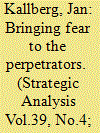

|
|
|
|
|
| Summary/Abstract |
Humanitarian cyber operations would allow democratic states to utilise cyber operations as a humanitarian intervention to capture information and create a foundation for decision making for collective international action supported by humanitarian international law. This follows the legal doctrine of responsibility to protect, which relies first on the nation state itself but when the state fails to protect its citizens, then the international community can act, ignoring the repressive or failed state’s national sovereignty.
|
|
|
|
|
|
|
|
|
|
|
|
|
|
|
|
| 2 |
ID:
130999
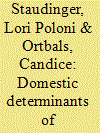

|
|
|
|
|
| Publication |
2014.
|
| Summary/Abstract |
We examine the degree to which national political setting, namely domestic political opportunity structures, influences the transnational activities of women's groups in the United Kingdom, France, and Germany. The literature suggests that social groups are more likely to choose international activity when national institutions provide fewer opportunities for domestic activity (Keck and Sikkink 1998; della Porta and Tarrow 2005). Using data about women's groups' activity from a content analysis of news wires from 1980 to 2008, we conclude that women's groups act in the domestic sphere significantly more than they act in the international arena-even when acting on transnational issues-and that groups choose international action when domestic opportunities are less hospitable to group action. Thus, we argue that the domestic sphere continues to be a major influence on social movement activity even as globalization and transnationalism increase.
|
|
|
|
|
|
|
|
|
|
|
|
|
|
|
|
| 3 |
ID:
134008
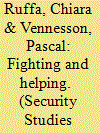

|
|
|
|
|
| Publication |
2014.
|
| Summary/Abstract |
In complex humanitarian emergencies, why are NGO-military relations cooperative in some cases, yet deeply conflictual in others? Drawing on historical-institutionalist theoretical insights, we argue that NGOs and military organizations are embedded in, and responding to, domestic institutional configurations that define a set of political incentives and constraints, material and normative, which structures and influences the characteristics and outcomes of their relations. Counterarguments suggest that organizational differences and the nature of their missions affect NGO-military relations. Using fresh empirical evidence we assess these arguments by comparing the Italian and the French experiences of NGO-military relations during the NATO-led International Security Assistance Force (ISAF) mission in Afghanistan and the UN mission in Lebanon (UNIFIL II) between 2007 and 2011.We find that domestic institutional configurations are not left behind when NGOs and military units deploy abroad. Rather, they shape NGOs' and militaries' capacity to work together instead of at cross purposes and ultimately influence the success of international action.
|
|
|
|
|
|
|
|
|
|
|
|
|
|
|
|
| 4 |
ID:
100013


|
|
|
|
|
| Publication |
2010.
|
| Summary/Abstract |
UN peacekeeping rose to prominence as an instrument of international action based on its enacting a root metaphor that promised the reversal of politics as usual and the creation of a more equitable world. Practices developed in traditional peacekeeping created a culture of peacekeeping that reinforced this root metaphor through a linking of strategic policy to actions in operations. This article argues that developments in the way that peacekeeping has been used are undermining the root metaphor such that the cultural inversions associated with peacekeeping are increasingly difficult to maintain, if they can be continued at all. The result is that peacekeeping has been sliding toward recreating earlier practices of imperial policing by placing the concerns of international actors ahead of those of the local communities in which peace operations take place.
|
|
|
|
|
|
|
|
|
|
|
|
|
|
|
|
| 5 |
ID:
128080
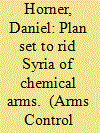

|
|
|
|
|
| Publication |
2013.
|
| Summary/Abstract |
The UN Security Council on Sept. 27 unanimously adopted a plan for destroying Syria's chemical arsenal, endorsing a blueprint that the Executive Council of the Organisation for the Prohibition of Chemical Weapons (OPCW) had approved a few hours earlier. The actions by the 41-member Executive Council, which generally operates by consensus, and the 15-member Security Council establish timelines for the destruction of Syria's chemical weapons. The two councils were building on a framework agreement for control and elimination of Syria's arsenal concluded by Russian Foreign Minister Sergey Lavrov and U.S. Secretary of State John Kerry on Sept. 14 after days of intensive bilateral negotiations in Geneva. The two council decisions spell out ways in which the United Nations and the OPCW are to coordinate in overseeing Syria's chemical disarmament. The documents approved by the two councils cite Article VIII of the Chemical Weapons Convention (CWC), which says that the Executive Council should refer compliance issues "of particular gravity and urgency" to the Security Council. The OPCW is the international body that implements the CWC.
|
|
|
|
|
|
|
|
|
|
|
|
|
|
|
|
| 6 |
ID:
131000
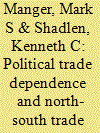

|
|
|
|
|
| Publication |
2014.
|
| Summary/Abstract |
Why do developing countries negotiate North-South trade agreements, when they already enjoy preferential market access to developed-country markets? Most developing countries benefit from the generalized system of preferences (GSP) and related schemes when they export to the United States, the EU, and other developed economies. And yet, many pursue fully reciprocal agreements that require major concessions to the developed partner. We argue that this is due to the nature of the GSP as a unilateral concession that can be (and often is) taken away. High dependence on unilateral, removable preferences generates "political trade dependence" (PTD). We distinguish PTD from standard measures of trade dependence, and we explain why PTD motivates developing countries to seek North-South Regional Trade Agreements (RTAs). We show the effects of PTD with a selection of illustrative cases and test our hypothesis on a data set of EU and US trade agreements with developing countries. We find robust statistical support for our hypothesis that high and rising levels of PTD make the negotiation of a North-South RTA more likely.
|
|
|
|
|
|
|
|
|
|
|
|
|
|
|
|
| 7 |
ID:
152956


|
|
|
|
|
| Publication |
New Delhi, Viva Books, 2016.
|
| Description |
xi, 299p.hbk
|
| Standard Number |
9789385919039
|
|
|
|
|
|
|
|
|
|
|
|
Copies: C:1/I:0,R:0,Q:0
Circulation
| Accession# | Call# | Current Location | Status | Policy | Location |
| 059066 | 364.15/LUP 059066 | Main | On Shelf | General | |
|
|
|
|
| 8 |
ID:
129671
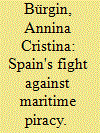

|
|
|
|
|
| Publication |
2014.
|
| Summary/Abstract |
The rise of piracy in the Indian Ocean in the first decade of the 21st century prompted international action to protect civilian vessels. This article examines the case of Spain, a major European protagonist in the fight against piracy, leading maritime security governance with official as well as private security forces. It explains Spain's twin-fold approach to counter-piracy, participating through its armed forces in the European Union's Operation Atalanta and deploying armed private security personnel on civilian vessels, an approach with strong support in Spain, but controversial in other European countries. This analysis emphasizes sources of legitimacy, and shows that the two-fold strategy has a high output-legitimacy, supported by interested groups and the Spanish public. Use of both official and private security forces is perceived as the best way to protect lives and national economic interests. Other major European maritime countries - including France, Germany and Netherlands - struggled with these problems, gradually shifting to emulate the Spanish solution. These findings support theoretical assumptions about output-legitimacy; a policy gains legitimacy if involved actors consider it the best way to solve the problem.
|
|
|
|
|
|
|
|
|
|
|
|
|
|
|
|
|
|
|
|
|